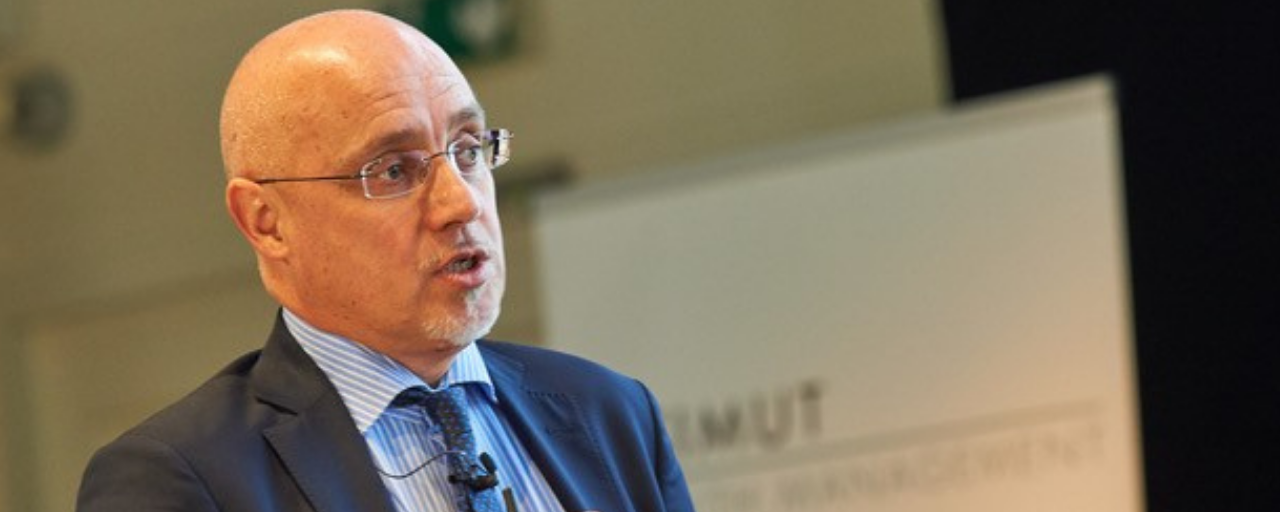You started in 1990 at Banca Popolare dell’Emilia-Romagna. In 2000, you transitioned to the Popolare di Verona. Shortly after, in 2002, you contributed to the birth of the Italian branch of Vontobel, the Swiss private bank specializing in asset management and private banking, and then moved to Azimut. Large wealth manager, how do you understand the client's needs?
In these thirty years of activity on the financial markets, I have overcome many delicate moments and profound crises that have gone down in history.
I was wearing "shorts" when the first Gulf War broke out in August 1990, a few months after my first hiring, and I was still a beginner when the Lira crisis came in 1992 as well as the rate crisis of 1994. The collapse of the LTCM fund and the Russian debt in 1998 were also huge moments of tension.
In 2000 we were tested by the New Economy bubble, but nothing compared to the shock of the 2001 attack on the Twin Towers, which I will never forget because I had only been a dad for a week.
The financial crisis of 2008, with the consequent economic recession, was the mother of all crises, which left its mark on the skin of the managers but which I went through practically unscathed due to my propensity for conservative management.
The "sovereign debt crisis" in 2011, solved with Draghi's famous "whatever it takes" speech of 26 July 2012 and then again the devaluation of the Chinese renminbi in 2016 has led us to the present day: two years of pandemic and the outbreak of a war in the heart of Europe.
In the meantime, the regulatory framework changed, technology took over and the Single Currency opened up new scenarios for us.
I went through these moments first as a junior manager, in the 90s, and then as a senior and service manager at Bper Banca and Popolare Verona. I was the Investment Director in the SGR which we opened in Italy on behalf of the Vontobel group of Zurich in January 2002. Since 2011 in Azimut, I have held the role of Strategist and Senior Portfolio Manager within the Italian SGR, Chief Strategist of the Wealth Management division and member active in the various investment committees of the Azimut Global Team, the Discretionary Team and the Advisory Team.
My peculiarity has always been to cover both a technical and consultancy role, constantly comparing myself with investors, whether they were entrepreneurs or individual family groups. This allowed me to develop a strong sensitivity to customer needs, and a strong customer orientation.
When a manager finds himself managing financial portfolios without direct confrontation of the people behind them, he often focuses on mere technical aspects or comparisons with market parameters that tend to be very impersonal.
On the other hand, when you give “a face to a portfolio”, as I always say, you realize what stories, lives and companies are behind it. Financial capital is important for everyone, of course, but just as careful management provides a sense of security to the person or to any company, the loss of financial capital also directly impacts the psychological and often physical health of the investor.
The direct confrontation with the client helps avoid an excess of over-confidence and increases the sense of responsibility in the investment.
You have shown competence in IAG, where you are also part of the Fintech Community. Can you tell us how you approached the association and your business angel experience?
I joined IAG in March 2017 out of personal and professional curiosity, also following the solicitation and presentation to the board by my friend Carlo Tassi. I was struck by his passion when he told me about his experience as a Business Angel with an entrepreneurial spirit and strongly oriented towards innovation.
Azimut had already moved to the world of the real economy a few years earlier with the Libera Impresa project, from which the SGR dedicated to unlisted alternative investments was born. I have always been enriched by the comparison with an entrepreneur, used to talking about concrete elements of the life of his company. Listed finance, on the other hand, and especially in recent years, is moving on a very different level from the typical business issues. Elements such as sentiment, flows, price analysis and quantitative movements induced by Central Banks, have assumed an ever greater influence in the financial markets. Talking with the entrepreneur allows a global macro manager like myself to get back "down to earth" to deal with much more micro issues, such as the influence of costs on margins, the business plan, M&A prospects, typical activities of a financial analyst.
In Azimut, with the SGR Azimut Libera Impresa, we have initiated direct investments or in agreement with large international groups in more advanced stages in the life cycle of a non-listed company.
The business angel, on the other hand, works in a very premature phase, early stage, when the company often does not yet exist. For this reason, participation in IAG perfectly integrates my knowledge in the non-listed world.
IAG also collaborates with the Digitech fund - Azimut Libera Impresa (Azimut Group), with which it has already jointly carried out the financing round in Cubbit, and with which there are other investments in the pipeline. How do you value the collaboration between a group of professional angels and an institutional investment fund?
I believe it is an excellent synergy that exploits the verticality and skills of a specialized group such as Gellify, which is delegated by Azimut in the management of the Digitech fund, with the largest amounts made available for investments by both IAG and Azimut. Furthermore, the synergy between a network of Angels and an institutional group makes it possible to effectively intercept the investment opportunities that may arise on the market from time to time.
Can a business angel go beyond their established and reassuring investment habits? Are diversification and innovation weapons of defense to protect one's assets?
As early as the 1950s, the economist Markowitz based his theory of the efficient frontier on the diversification of a portfolio. The combination of listed and unlisted investments follows and amplifies this concept.
At the beginning of my career, information on listed financial markets was scarce; for this reason, the fundamental analysis on a listed company made it possible to receive better information in advance than other managers. Today everyone has real-time information on listed markets and it is very difficult to find obvious undervaluations not seen by the market. The prices of securities already absorb all this information because listed markets are much more efficient now than thirty years ago. Obviously, an investor who considers a stock undervalued does so on the basis of his own scenario. However, if the stock is "apparently" undervalued compared to classic fundamental parameters (eg. The p / e), it means that a large part of the market is well aware of this undervaluation but believes that, for various reasons, it is right to attribute that price to it. In the world of the unlisted, however, it is quite another thing. Knowing the management of a company in depth, entering into the merits of its balance sheet, knowing the development strategy before others are fundamental parameters for "arriving before others" in choosing where to invest.
There are always three personal variables for building a portfolio: risk appetite (what volatility I am willing to bear for my investments), return expectations and time horizon. I believe good advice is to separate the expectations for managing your capital according to specific objectives (retirement, the needs of children, the purchase of a second home, unforeseen emergencies etc ...). If a sound financial planning principle is adopted and unlisted investments are also used for one's assets, combining them with the right time expectations, will result in the expectation of return on the entire portfolio to be significantly increased.
Fintech has meant a total upheaval in a highly traditional sector like the banking one, of which you have long been a part of. How would you describe this evolution? This new way of banking, economics and finance requires human capital that has the tools to be able to approach it. Are we ready?
I worked in the traditional banking sector as I followed the asset management and private banking sector, for many years. Up until fifteen years ago, the rule of market penetration horizontally (branches in every corner of the streets) by commercial banks was in force. They based their profitability mainly on the interest margin by intermediating money between those who deposited it and those who lent it. The margin from services, brokerage or other sectors always remained secondary. Then came the 2008 crisis with the consequent collapse of interest rates. For the banks, two main aspects arose: the increasingly stringent capital requirements in the granting of loans, and the collapse of interest rates which gradually wore out the banks' ability to provide credit (and consequently make profits). In addition, the takeover of technology which in itself replaced the physical presence of the operator with a digital one. The decline that has affected Italian banks since 2007 concerns precisely the inability to reduce fixed costs quickly (represented by branches and staff) compared to how revenues began to decline. Banks are trying to react with an aggregation process that leads to greater efficiencies in economies of scale. On the other hand, as the alternatives on the market are reduced, the price structure brought about by less competition is less efficient for the bank customer. Current fintechs start from an opposite side. They are generally not "capital intensive", they’re digital and very often specialized and not generalist. They are increasing more and more. For example, the loans granted by fintechs in Italy (fintech lending) have multiplied, in the last three years, the intermediated volumes and the number of companies involved by ten. I believe that Fintechs are much more in line with the needs of a modern entrepreneur. In Azimut we have raised more than 1.5 billion euros from investors, with highly incentivized instruments with fiscal measures by the state, which allocate credit to unlisted SMEs as well as to many other alternative credit instruments. While the interest rates of listed bonds are still strongly conditioned by the movements of financial repression by Central Banks, with the paradox of negative interest rates that we are still observing, in the world of unlisted credit, the relationship between credit risk and price (or interest rate) is much more linear. Obviously, you need an uncommon expertise and knowledge of the sector in the listed world, but the information asymmetry also allows you to find unthinkable investment opportunities in the traditional world of listed credit. We are convinced that the "bridge", the connection between the management companies specialized in investments in the real economy, both in private debt and in private equity, which put the investor in direct relationship with the company, disintermediating the banks, brings interesting investment opportunities that were generally closed to the Italian investor only a few years ago.








